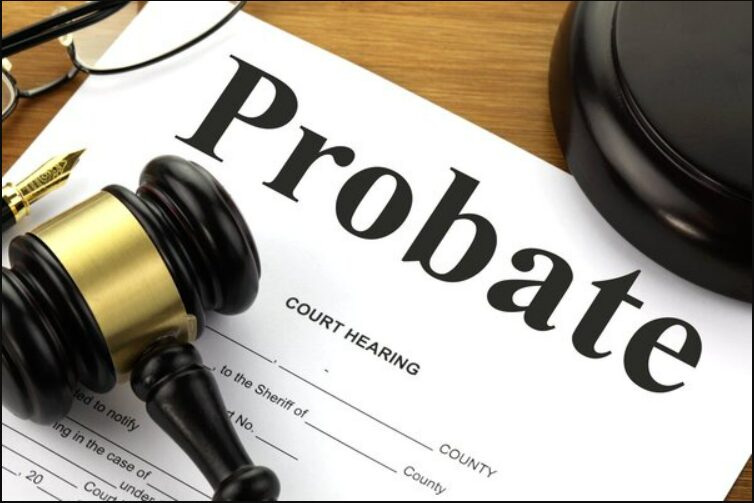Probate of Will made Simple
Probate of a will is the legal process by which a court validates a deceased person’s will and ensures that it is carried out according to their wishes. While the probate process can vary depending on the jurisdiction and the complexity of the estate, here is a simplified overview of the steps involved

Probate of Will
Filing the Will: The first step in the probate process is to file the deceased person’s original will with the probate court in the jurisdiction where they resided at the time of their death.
Petition for Probate: The executor named in the will or another interested party submits a petition to the probate court requesting the formal probate of the will and appointment of the executor.
Notice to Interested Parties: Notice of the probate proceedings must be given to all beneficiaries named in the will, as well as legal heirs-at-law and other interested parties, in accordance with state laws and court rules.
Probate Hearing: The probate court holds a hearing to review the petition for probate, examine the validity of the will, and address any objections raised by interested parties.
Proof of Will: The probate court may require witnesses to the will to provide sworn statements or testimony confirming the authenticity of the will and the circumstances of its execution.
Inventory and Appraisal: The executor is typically required to prepare an inventory of the deceased person’s assets and submit it to the probate court for review. The court may also require an appraisal of certain assets to determine their value.
Payment of Debts and Taxes: The executor is responsible for identifying and paying the deceased person’s outstanding debts, taxes, and expenses using assets from the estate.
Distribution of Assets: Once debts and taxes have been paid, the executor distributes the remaining assets of the estate to the beneficiaries named in the will, in accordance with the terms of the will and applicable state laws.
Final Accounting and Closing of Estate: The executor prepares a final accounting of the estate’s assets, income, expenses, and distributions, which is submitted to the probate court for approval. Once the court approves the final accounting, the estate can be closed, and the probate process concludes.
Requirement of Probate of Will in India
Immovable Property:
In many states, probate is typically required for wills that involve immovable property (real estate), regardless of the value of the property. Immovable property includes land, buildings, and any permanent fixtures attached to the land.
Moveable Property:
The requirement for probate of wills involving moveable property (such as bank accounts, shares, jewelry, vehicles) varies depending on the value of the assets and the policies of financial institutions or other entities holding the assets.
Jurisdictional Differences:
The requirement for probate may vary based on the specific laws and practices of the state or union territory where the property is located or where the deceased person resided at the time of their death.
Executor’s Authority:
Probate of a will establishes the legal authority of the executor named in the will to administer the estate and distribute the assets according to the terms of the will. Without probate, the executor may encounter difficulties in dealing with third parties and enforcing the provisions of the will.
Exceptional Circumstances:
In certain cases, probate may not be required if the estate is small, if the assets are held jointly with rights of survivorship, or if the assets are governed by beneficiary designations (e.g., life insurance policies, retirement accounts) that bypass probate.
Legal Advice:
It’s advisable for executors and beneficiaries to seek legal advice from professionals experienced in estate planning and probate matters to determine whether probate is necessary in a particular situation and to understand the applicable laws and procedures.
Benefits for Probate of Will
Legal Confirmation of Will Validity: Probate provides a formal legal confirmation of the validity of the deceased person’s will. This ensures that the terms of the will are legally recognized and can be enforced by the executor in administering the estate.
Executor’s Authority and Protection: Probate establishes the legal authority of the executor named in the will to act on behalf of the deceased person’s estate. It provides protection for the executor against claims of unauthorized actions and helps shield them from personal liability in the administration of the estate.
Creditor Notification and Debt Resolution: During the probate process, creditors are notified of the deceased person’s death, and procedures are in place for resolving outstanding debts and claims against the estate. Probate provides a structured framework for addressing creditor claims and ensures that debts are paid in accordance with legal priorities.
Clear Title Transfer of Assets: Probate facilitates the transfer of ownership of assets from the deceased person’s name to the beneficiaries named in the will. It provides a clear and legally recognized process for transferring title to real estate, bank accounts, securities, and other assets to the intended recipients.
Dispute Resolution and Legal Protection: Probate offers a formal mechanism for resolving disputes among beneficiaries, creditors, and other interested parties regarding the administration of the estate. It provides a forum for addressing conflicts and disagreements in a structured and legally binding manner, reducing the likelihood of prolonged litigation.
Protection of Beneficiary Interests: Probate helps safeguard the interests of beneficiaries by ensuring that their inheritance rights are protected and enforced according to the terms of the will. It provides transparency and accountability in the distribution of assets, minimizing the risk of fraud or mismanagement.
Finality and Closure: Probate provides a conclusive resolution to the administration of the deceased person’s estate, allowing for the orderly distribution of assets and the closure of the estate. It provides a clear endpoint to the legal process and allows beneficiaries to move forward with their inheritance



Checklist for Probate of Will
Review the Will: Carefully review the original will to ensure its validity, completeness, and clarity.
Identify the Executor: Determine the person named as the executor (personal representative) in the will who will be responsible for administering the estate.
Gather Documents: Collect all necessary documents including the original will, death certificate of the deceased, identification documents of the executor, and any other relevant paperwork.
File Petition for Probate: Prepare and file a petition for probate with the appropriate probate court in the jurisdiction where the deceased person resided at the time of their death.
Notice to Interested Parties: Provide notice of the probate proceedings to all interested parties including beneficiaries named in the will, legal heirs-at-law, and creditors as required by state laws and court rules.
Publish Notice in Newspaper: Publish a notice of the probate proceedings in a local newspaper as required by state laws to notify potential creditors and interested parties.
Inventory of Assets: Prepare an inventory of the deceased person’s assets including real estate, bank accounts, investments, personal property, and any other assets subject to probate.
Appraisal of Assets: Obtain appraisals or valuations of assets as necessary to determine their fair market value for estate tax purposes and distribution to beneficiaries.
Payment of Debts and Taxes: Identify and pay any outstanding debts, taxes, and expenses of the estate using assets from the estate as required by law.
Accounting and Recordkeeping: Maintain accurate records of all financial transactions, receipts, and disbursements related to the administration of the estate.
Distribution to Beneficiaries: Distribute the remaining assets of the estate to the beneficiaries named in the will after all debts, taxes, and expenses have been paid.
Final Accounting and Report: Prepare a final accounting and report of the estate’s assets, income, expenses, and distributions for review and approval by the probate court.
Court Hearing: Attend any required court hearings related to the probate proceedings and provide testimony or documentation as needed.
Obtain Court Order: Obtain a court order from the probate court formally approving the final accounting and closing the estate.
Transfer of Title: Transfer title of real estate, bank accounts, securities, and other assets from the deceased person’s name to the beneficiaries in accordance with the terms of the will and applicable laws.
File Closing Documents: File closing documents with the probate court to officially close the estate and terminate the probate proceedings.
Distribution of Documents: Provide copies of the final accounting, court order, and other relevant documents to beneficiaries and other interested parties as required.
Estate Tax Filings: File any required estate tax returns and pay any applicable estate taxes in accordance with federal and state tax laws.
Release and Discharge: Obtain releases and discharges from beneficiaries and other interested parties acknowledging receipt of their inheritance and releasing the executor from further liability.
Document Retention: Retain copies of all probate documents, records, and correspondence for the required retention period as specified by state laws and regulations.
